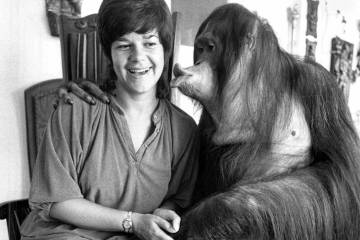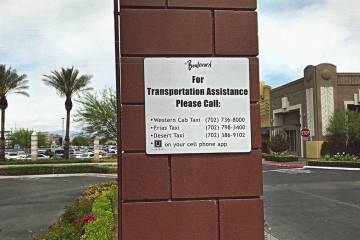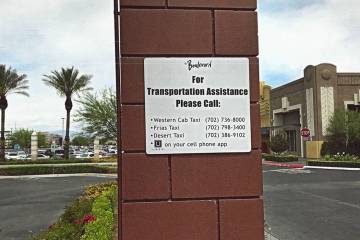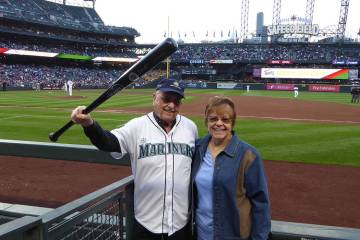Protection for journalists’ personal records at stake in case
In some ways, the question of quashing a subpoena seems like a dinky issue to be before the Nevada Supreme Court.
What makes it a complex issue is that Dana Gentry is a Las Vegas journalist, protected by Nevada’s shield law. Subpoenaing her opens the door to subpoenaing every journalist in Nevada.
That’s why arguments Tuesday at the Regional Justice Center before the Nevada Supreme Court drew a crowd of heavyweight news people, some to show support, others to cover what many don’t understand is a First Amendment issue.
John Bailey, an attorney representing Jeff Guinn, son of the late Gov. Kenny Guinn, started his argument claiming he had “reason to believe” Gentry took money, loans and gifts and was extorted by litigants who are suing Guinn and being countersued by him.
Bailey subpoenaed Gentry in August 2011, asking her to provide documents showing she received gifts and loans and was extorted by people suing Guinn. His theory is that she slanted her news coverage favorably toward people including Donna and Chuck Ruthe, Vicki and Stephen Quinn and Charles Thompson, who all lost money investing in Guinn’s Aspen Financial Services.
Gentry turned to District Court Judge Allen Earl, who quashed the subpoena, citing the shield law.
If Bailey had evidence the executive producer of “Face to Face With Jon Ralston” was influenced by people suing Guinn, Earl said the attorney should share that information with him and maybe he would change his mind.
Instead of putting up, Bailey is asking the Supreme Court to force Gentry to answer the subpoena. He argued she wasn’t protected by the shield law because this was personal, not professional.
Bailey said Gentry is not being asked to reveal sources; she is being asked to reveal information about relationships she has with litigants on one side of a civil case.
Gentry’s attorney, Don Campbell, who has represented local journalists, including me, said Bailey’s allegations are false and Guinn’s attorney is harassing Gentry with a subpoena to damage her reputation.
Because attacking one journalist to discourage news gathering is attacking all, the American Civil Liberties Union of Nevada, the Nevada Broadcasters Association, the Nevada Press Association, the Reporters Committee for Freedom of the Press and Stephens Media (my employer) asked the justices to uphold Earl’s decision.
Remember, Gentry isn’t a litigant in this case or named as a co-conspirator against Guinn. She covered a story.
What will the justices do?
Saying this is a discovery issue, Justice Mike Cherry asked, “Why should we intervene at this time?”
Justice Jim Hardesty, who once represented the Reno Gazette-Journal, asked the most questions and seemed the most sympathetic to Gentry. Even assuming the facts are correct, “that doesn’t change the character of privileged information,” he said.
“Would Bob Woodward have been required to disclose a $10,000 payout by Deep Throat?” Hardesty wondered .
Justice Nancy Saitta authored a strong opinion in 2012 about open records, ordering former Gov. Jim Gibbons to disclose his emails. It’s not precisely on point with this case, but it seems a sign leaning in favor of the First Amendment.
Justice Mark Gibbons asked why the burden wasn’t on Bailey to demonstrate more than suspicions.
Justice Michael Douglas seemed the most open to the idea that journalists don’t have carte blanche to refuse to respond to a subpoena.
Justice Ron Parraguirre wasn’t present. Chief Justice Kris Pickering recused herself.
The justices have a chance to strengthen the shield law by upholding Earl and clarifying whether the shield law protects records that are not acquired or created for production of a news story.
Or, in less legal terms, they can clarify whether journalists’ personal records are fair game for anyone who doesn’t like news coverage.
If the answer is yes, some attorneys will have a field day harassing Nevada journalists.
Jane Ann Morrison’s column appears Monday, Thursday and Saturday. Email her at Jane@reviewjournal.com or call 702-383-0275.






















